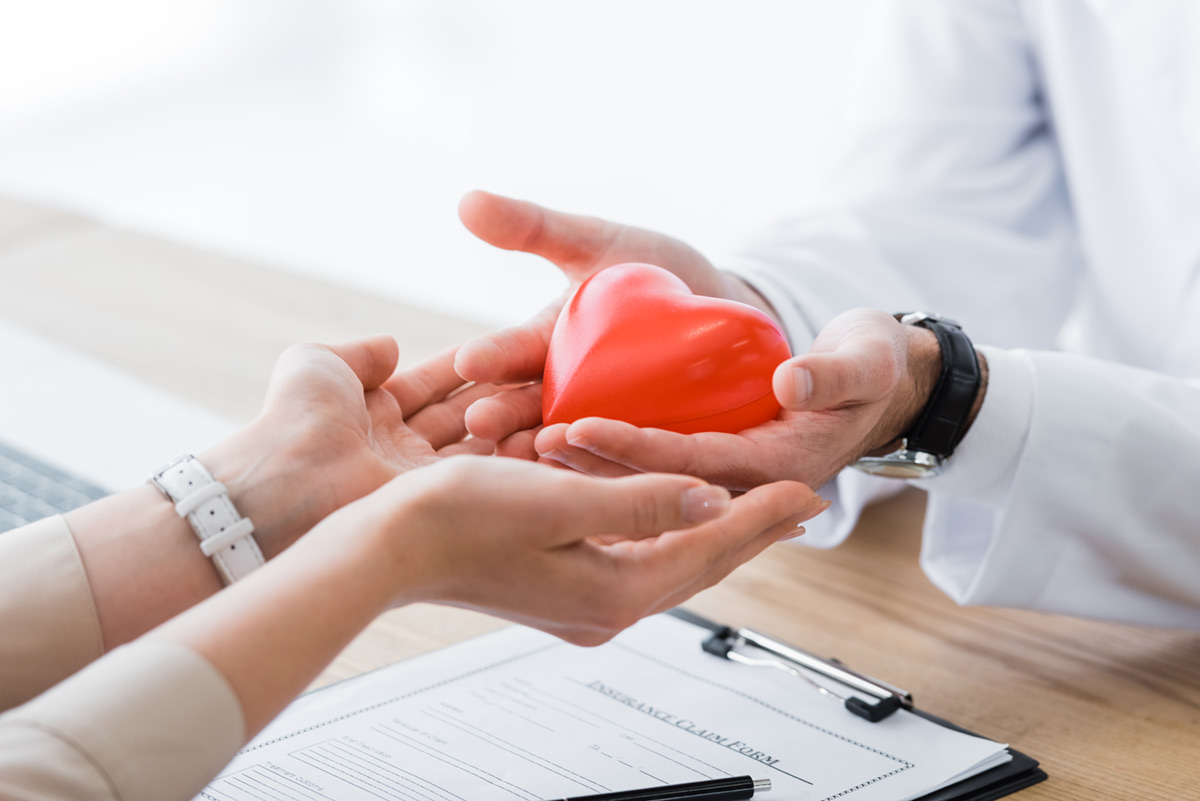The Effects of Cancer on your Heart!

What is Cardio-Oncology?
Cardio-Oncology is the management of heart conditions in patients who have been treated for cancer. Cardiologists can assess patients for potential risk of developing heart conditions if patients receive certain types of cancer drugs, or following radiation treatment to the chest and neck. The cardiologist will work with the oncologist to protect patients during their treatment by closely monitoring the heart and recognizing heart trouble early in treatment. In essence, we work proactively to cardio-protect your heart.
Monmouth Cardiology is partnering with Memorial Sloan Kettering (MSK) and local oncology practices to create the first formalized Cardio-Oncology program in the area. The goals for the program are to:
- Ensure better outcomes for patient with cancer and cardiac issues
- Provide early detection of cardio toxic side effects from cancer treatments
- Prevent or reduce further cardiac damage and if possible, reverse it
- Monitor patients with potential cardiac issues who are receiving cancer treatments
- Maintain cardiac health for long term cancer survivorship patients
Cancer treatment needs to be aggressive and thorough to optimize survival however it also has the potential to create heart and vascular disease, which can be just as devastating. That being said, no one would want to limit the treatment for cancer or the “possibility” that it may cause heart disease in the future. The strategy is to identify high risk patients and treat them earlier, sometimes even before cardiac involvement occurs.
What is cardiac toxicity?
Cardiac toxicity is damage to the heart by harmful chemicals. Patient’s undergoing treatment for cancers are given drugs to kill cancer cells. A side effect is that the normal cells in and around your heart can also be killed. Besides cell death, other types of cardiac toxicity from cancer treatment include:
- Hypertension, also known as high blood pressure which is the measure of the force of blood pushing against blood vessel walls. High blood pressure is a major risk factor for coronary artery disease, kidney disease and stroke.
- Arrhythmias are a condition in which the heartbeat is too fast, too slow or irregular. Some types of arrhythmias are not serious while some predispose a patient to cardiac complications
- Ischemia occurs when blood flow to your heart is reduced thus damaging your heart muscle which reduces its ability to pump efficiently.
- Congestive heart failure is when the heart is unable to pump enough blood throughout the body. Some types of chemotherapy can cause mild or severe damage to the heart. If severe, congestive heart failure or other life-threatening problems can occur. A heart transplant may even be needed.
- Cardiomyopathy is when heart muscle becomes weakened, enlarged, thickened, or stiff. This can lead to changes in heart rhythm or to heart failure.
- Myocarditis is inflammation (swelling) of the heart. This can lead to changes in heart rhythm or heart failure.
- Pericarditis is inflammation (swelling) of the sac surrounding the heart. This can cause chest pain or heart failure.
- Acute coronary syndromes are caused by blood vessel damage, which reduces blood flow to the heart. This can cause chest pain or a heart attack (myocardial infarction).
Radiation and its Effects on the Heart
The patients who are at most risk for cardiac complications are the patients who receive radiation to the chest, such as:
- Lymphoma
- Breast Cancer
- Lung Cancer
- Esophageal Cancer
- Other Cancers- Thymoma, Mesothelioma, Sarcoma and Spine
These patients are at risk for:
- Ischemic disease
- Pericardial disease
- Cardiomyopathy
- Valvular Disease
- Arrhythmia/Autonomic dysfunction
Patients who are at a higher risk for potential cardiotoxicity are those that have pre-existing conditions, such as, diabetes, hypertension, hyperlipidemia and have a history of tobacco use or have had radiation therapy with prior cardiotoxic chemotherapy or a combination of both.
Comprehensive Cardiac Care
Pre Oncology Treatment
Obtaining a risk assessment prior to cancer treatment is imperative. It is important to understand your risk for developing cardiovascular disease. At Monmouth Cardiology Associates, we work closely with your “cancer “doctor (Oncologist) and provide a comprehensive evaluation and care plan to minimize potential cardiovascular complications. We combine a complete, personalized assessment with appropriate diagnostic testing and optimal cardiovascular therapies to ensure the best possible outcome.
Patients with a cancer diagnosis who have been treated previously or are actively being treated for cardiovascular disease; such as hypertension, coronary artery disease, congestive heart failure, heart valve disease, and cardiac arrhythmias will require a customized approach to their overall care. Our goal is to treat your existing conditions so that you, the patient, is healthy enough to respond to your cancer treatment.
For patients who have no previous cardiac history prior to their cancer diagnosis, our goal is to maintain cardiac health by pro-actively monitoring their cardiac status throughout treatment.
Regardless of your previous cardiac status a baseline Echocardiogram or if you have cardiotoxic chemotherapy an Echocardiogram with Strain Imaging is the gold standard for preventative screening.
During Oncology Treatment
The program is patient centered and individually customized due to the specificity of the patient’s chemotherapy. Patient’s meet with their nurse liaison after each Echo with Strain Imaging session to review their current oncology treatment plan, coordinate their cardiac treatment plan and schedule follow up visits.
Dependent upon results of the patient’s cardiac testing the treatment plans are adjusted accordingly after detailed collaboration with the Cardio-Oncologist and Oncologist.
The patient is always kept abreast of results and is an integral part of their care plan.
Advances in Detecting Cardiotoxicity
Baseline history and physical exam with attention to signs and symptoms of cardiovascular compromise is recommended for patients who will undergo potentially cardiotoxic cancer treatment with certain chemotherapeutic agents, in particular, anthracyclines (ex:Adriamycin) and monoclonal antibodies (ex: Herceptin). These agents are used regularly in chemotherapeutic regimens to treat a variety of malignancies, including leukemia, lymphoma, neuroblastoma, sarcoma, lung cancer, ovarian cancer, breast cancer, and gastric cancer.
Until now, the most common non-invasive monitoring measure for cardiotoxicity among cancer patients has been left ventricle (LV) ejection fraction (EF). The ejection fraction (EF) is an important measurement in determining how well your heart is pumping out blood and is used to diagnose and track heart failure. The ejection fraction (EF) can be calculated from an echo study or a Multi Gated Acquisition (MUGA) nuclear exam. Research and trends indicate strain rate imaging provides a high quality measure for possible earlier detection of cardiotoxicity.
Monmouth Cardiology Associates continues to strive to be on the leading edge of technology in order to provide our patients and the community with the latest advances in cardiac medicine. Monmouth Cardiology Associates has been the leader in Ocean and MonmouthCounty since 2016 in this advance care model, called Cardio-Oncology. We are also pleased to be able to offer this testing modality to our community at a fraction of the cost of institutions.
Heart Healthy Habits of Survivorship
1. Follow up with your Cardio-Oncologist. The follow up regimen will be specific to your cardiac response to your cancer treatment. Make certain to follow up with echocardiograms or echocardiograms with strain imaging as recommended. Working together in a team approach your cardiac conditions will be assessed and managed accordingly.
2. Follow-up with your Oncologist. It is important to follow your oncologist’s recommendations for checkups after you finish your treatment. These follow-up visits are necessary to ensure the cancer has not returned as well as to watch for side effects from the treatment you received. You may need an echocardiogram after receiving certain chemotherapies or radiation, have blood tests or other cardiac imaging tests. Discuss this with your doctor and ask when and for how long you should receive these tests.
3. Stay active. Studies have shown that increased physical activity results in a decrease of heart disease in all cancer survivors. Find something you enjoy doing such as jogging, walking, biking, swimming, yoga, or exercise classes. Get approval from your doctor, and follow a plan that keeps you active most days of the week for at least 30 minutes. Find a friend or family member who can help hold you accountable or make the activity more fun!
4. Eat healthful foods and keep a healthy weight. Eating a healthful diet can help decrease your risk of both heart disease and cancer. Try incorporating healthy foods slowly if making a big change to your diet right away is too difficult. Aim to have more vegetables and fruit in your daily meals and to decrease foods that are high in saturated fat or salt. Both Mediterranean and DASH diets are heart-healthy.
5. Stop smoking or never start. This is one of the most important steps you can take to decrease your risk of both cancer and heart disease. If you are a smoker, it is crucial that you quit. Speak with your doctor to ask about resources that can help you stop smoking.
6. Manage your stress. You are undergoing or have just completed treatment for your cancer, which was undoubtedly one of the most stressful situations you have experienced. Understandably, adding the ordinary stresses of everyday life to a diagnosis of cancer may be overwhelming. Be sure to talk to family, friends, and/or your doctor for tips on effectively managing your stress. In addition, many cancer centers or local hospitals have support groups, where you can meet with patients and survivors affected by your cancer type or similar cancers. Engage in activities that you enjoy and that help reduce your stress, such as listening to music, reading, and practicing yoga and meditation.
7. Sleep. If you are not already doing so, start practicing healthy sleep habits. It is important to get enough sleep for your heart health and overall wellness for many reasons; including the fact that lack of sleep can increase blood pressure. Try a few changes such as setting a bedtime and decreasing screen time (television, smartphone, tablet use) a few hours before bed. These small changes may help you sleep better and more deeply. Please talk to your health care professional if you have more questions about this.
8. Always listen to your body. After a diagnosis of cancer, many people become more aware of aches, pains, and lumps/bumps on their body. If you are worried about any symptoms, never hesitate to call your doctor. Also, if you ever experience severe chest pain or any life-threatening concern, dial 911.
Why Choose Monmouth Cardiology Associates, LLC
We have an experienced Cardio-Oncology team that is patient focused and technologically advanced. We are leading the way in Monmouth and OceanCounty in the Cardio-Oncology field. We have built and fostered strong relationships with area Oncologists and Memorial Sloan Kettering (Monmouth, Basking Ridge and Manhattan) to work collaboratively for the betterment of our community.
Our team consists of numerous Board Certified Cardiologists trained in Cardio-Oncology, Nurses, Medical Assistants, Registered Echo Sonographers and an Administrative team. Our fully accredited echocardiography labs utilize novel imaging techniques including strain imaging.
In addition, our office will work with major insurance companies to obtain prior authorizations for diagnostic testing. Our focus is to bring the most advanced technology to patients at a third of the cost of local hospital systems.


